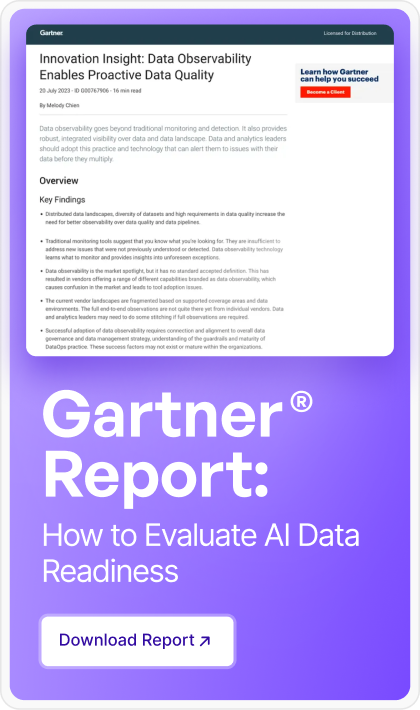According to a Gartner industry trends report, it's expected that AI startups as corporations will reach spending upwards of $10 billion toward AI technologies by the end of 2026. But for AI initiatives to succeed, a strong foundation is key, and that starts with data quality. Artificial intelligence is certainly exciting, but between 33% and 38% of AI initiatives suffer delays or failures from inadequate data quality.
Imagine building a modern artificial intelligence model to maximize your supply chain, only to discover holes in the data, erroneous information, and discrepancies. The model underfits, costs grow, and customer satisfaction falls. For companies who overlook corporate data quality prior to using artificial intelligence, this is their painful reality.
Understanding Enterprise Data Quality
Enterprise data quality measures an organization's data quality, accuracy, consistency, and reliability. It keeps data clean, well-managed, and useful throughout corporate operations. With modern technologies like AI and machine learning, high-quality data is essential for informed decision-making, mistake reduction, and process efficiency. This involves several key elements:
- Accuracy: Data must correctly reflect real-world scenarios. A company's customer data may be obsolete or faulty, causing an AI model to make inaccurate predictions and lead to bad marketing or customer service.
- Consistency: Data must be consistent across systems and datasets. Inconsistent data can contradict findings and make AI-driven conclusions untrustworthy. A worldwide store may have inconsistent inventory data across countries, causing AI-driven supply chain models to overestimate or underestimate stock needs.
- Completeness: Incomplete data can throw AI models off and lead to wrong conclusions. For instance, in the financial sector, an AI-driven credit score model prefers particular demographics due to inconsistent historical data; this will result in biased lending decisions.
- Reliability: In industries like retail and banking, obsolete data can lead to missed opportunities or wrong risk assessments. Therefore, AI models need current data.
The Risks of Poor Data Quality in AI Initiatives
Launching AI endeavors without first assuring data quality has considerable consequences.
Inaccurate AI predictions
Poor data quality can cause AI algorithms to make inaccurate predictions or incomplete or inconsistent data, which will lead to flawed outputs. This can include inaccurate product recommendations and risk assessments.
Increased costs
Data quality correction after AI implementation is time-consuming and expensive. According to Gartner, poor data quality costs organizations an average of $12.9 million annually, including the expenses of finding and fixing data mistakes and lost opportunities from faulty data-driven decision-making.
Damaged reputation
The effects of poor data quality go beyond financial costs. Bad data can ruin a company's reputation when AI models deliver biased or erroneous results. A single mistake can have enduring ramifications in the digital age, where customer trust is hard to win and quick to lose.
Regulatory and compliance risks
Poor data quality can violate regulations and compliance in finance and healthcare, where data privacy and accuracy are crucial. Poor data can lead to investigations, penalties, and other legal action against AI algorithms that produce biased or incorrect results.
How Enterprise Data Management Supports AI Readiness
Excellent data management keeps your company's data organized, accessible, and safe. Here are the critical components of Enterprise data management that makes an enterprise AI-ready.
Data governance: Ensuring proper management and protection
Data governance is an essential component of AI readiness about having defined policies and regulations over how data is collected, stored, and accessed within an organization. It gives a ground for control that bases down to ensure quality and security and adheres to data rules, meaning that the data deployed in AI projects will be ethical, unbiased, and trustworthy. It can prevent misuse and ensure high-quality datasets for the training of AI models by defining data ownership, access controls, and compliance with regulations. This structured approach guards not only sensitive information but also helps build reliable and accurate information in AI systems to be used to support compliant decisions and drive innovation with confidence.
Data integration: Creating a unified dataset
Data integration is an inevitable component that makes an enterprise ready for AI because it gathers information from all sources and puts them into one holistic, complete dataset to be analyzed by AI systems. When different departments, tools, or platforms have structured and unstructured data integrated, the AI models have full, high-quality information that could be quite useful in training and decision-making. This process will eradicate data silos while also ensuring better consistency within the data so that it's easier to discover patterns and make accurate insights. With effective data integration, the data environment will easily flow when supporting AI projects operating with reliable and up-to-date data, which leads to business outcomes being better; simultaneously, it allows for smarter, data-driven decisions.
Data cleansing: Eliminating inaccuracies and inconsistencies
Data cleansing is another area in the process of making the enterprise ready for AI. That is the process of ascertaining the accuracy and consistency of the data in AI models with no errors at all. This, therefore means that identification and correction of errors like the ones of duplicate entries, missing values, or even incorrect data formats are improved by the quality of the dataset, that would be crucial for training reliable AI systems. Clean data helps AI models make more accurate insights, informed predictions, and avoid biases from bad data that could happen. That is how solid AI projects are built, where organizations can make much better decisions and outcomes.
Implementing an Enterprise Data Platform for AI Success
The integrity, scalability, and real-time processing of data from multiple sources on an Enterprise Data Platform (EDP) are essential for AI-driven decision-making. Let's find out the benefits of implementing EDP.
Key benefits of implementing an EDP:
- Centralized data management: Enhances data consistency and accessibility, improving AI accuracy.
- Improved data quality: Leads to more reliable AI outcomes through built-in tools that cleanse and standardize data
- Scalability: Supports growing AI demands by seamlessly integrating new data sources
- Real-time data processing: Enables timely AI-driven decisions, increasing operational efficiency
Why Investing in Enterprise Data Quality Yields Long-Term Benefits
Strategically investing in enterprise data quality improves business intelligence and decision-making over time. Additionally, business intelligence tools produce more precise insights from accurate, consistent, and trustworthy data, helping businesses flourish through informed decisions. With high-quality data, businesses can detect patterns, forecast results, and create strategies to meet business goals, strengthening their market position with suitable overall enterprise data solutions.
Final Thoughts
Data-quality-oriented businesses clearly shine in artificial intelligence. Investments in data quality pay off beyond artificial intelligence. High-quality data is what business intelligence depends on to guide choices, improve processes, and lower risk. It also aids in the company's brand protection, avoidance of expensive fines, and regulatory compliance.
Acceldata's data quality solutions manage and improve enterprise data quality to help your business build solid AI efforts. The platform helps businesses cleanse, regulate, and combine data for AI readiness and long-term success.
Summary
This blog emphasizes the significance of prioritizing enterprise data quality before implementing AI projects. High-quality data is needed for AI forecasts, efficient operations, and good decisions. Poor data quality causes more costs, regulatory concerns, and reputation loss. Businesses may improve AI results, expand, and stay ahead in this competitive industry by prioritizing data quality.








.png)








.webp)
.webp)


